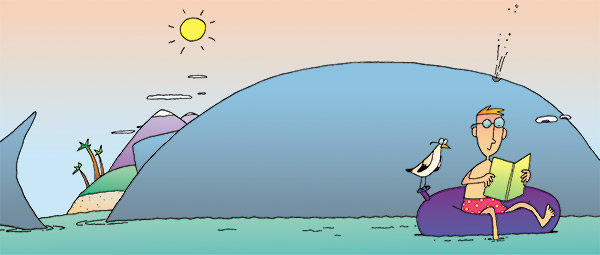
At a recent family get-together, a cousin and I were talking about her oldest daughter, Katlin, a sophomore-to-be in high school. My cousin mentioned that Katlin had a required reading list for the summer as preparation for Honors English. Frankenstein and Brave New World were two of the titles she mentioned. She then asked me what I thought about the choices. I said that Katlin might be in for a challenging summer. And I left it at that.
Here’s what I really thought: Trying to slog through these novels by herself, in summer no less, may completely frustrate Katlin. Classic literature is best appreciated as a group endeavor, headed by someone who knows his or her literature. By summer’s end, Katlin will have had it up to here with Literature (with a capital L) and, worse yet, the turnoff may affect her feelings about any type of reading, including pleasure reading.
The exchange brought to mind an old blog post entitled “The Tale of Two Tables” in which the writer, Donalyn Miller, had encountered a high school boy at a bookstore who was ready to buy Kate Chopin’s The Awakening. Miller asked the boy why he wanted to read that particular book. He responded that he had to read four novels from a prescribed list during the summer, and The Awakening was the shortest one of the bunch. He also added that he was going to be tested on his reading in the fall.
Summer reading lists are obviously in vogue. Don’t students do enough prescribed reading during the school year? What message does this approach to literature give students: that the reading of good books is just another task to complete, another body of information to be tested on? Is that what we want students to think of when it comes to reading literature—especially when it is part of their summer reading?
In Insult to Intelligence, Frank Smith states, “None of us can learn something that we don’t understand, that we are not interested in.” If we are to believe Smith (and I do), what chance is there that these students will learn much of anything from their prescribed summer reading? We all know the answer to that question. For the most part, the students won’t be interested in the texts, and most assuredly, there will be parts that they don’t understand. Smith adds, “The worst conditions for learning and remembering are when someone tells us precisely what we should be doing.” This applies doubly for teenagers. I can just imagine the students’ mindset when they pick up one of these books in mid-July or August.
And then to think that students are being tested on their reading. They’re already tested ad nauseam during the regular school year. Now we have to test them on something they are doing in the summer. Are these increased demands engaging students more in the learning process or are they turning them off? We all know the answer to this question, too.
A Better Approach
Now, I’m not against teachers encouraging students to read during the summer. Perhaps near the end of the school year, teachers and students together should create a list of “good reads,” complete with mysteries, romances, contemporary drama, historical drama, science fiction, creative nonfiction, and so on. And I’m not opposed to some classic titles on the list. But, as I stated earlier, if students choose to read challenging books during the summer, they should be part of a discussion group to do so, led by someone who truly knows and loves the literature.
In Uncommon Sense, John S. Mayher states, “A good reader is one who reads widely, pleasurably, and consistently, for many diverse purposes and needs.” During the summer break, students have the time to read “widely” and “pleasurably,” so let’s have them read on their own terms and for their own enjoyment. The next mystery or modern drama they read this summer may be the one that hooks them on books forever. The chances that Frankenstein will do that are slim to none.
Over the years I’ve collected many quotations dealing with reading and writing. I leave you with four of them from famous writers. My guess is that none of these individuals would want to prescribe the summer reading for anyone.
“My education was the liberty I had to read indiscriminately and all the time, with my eyes hanging out.”
—Dylan Thomas
“Read. Read. Read. Read everything—trash, classics, good and bad,… Read! You’ll absorb it.”
—William Faulkner
“There’s nothing more exciting to me than to read books.”
—Toni Morrison
“Read like a wolf eats.”
—Gary Paulsen